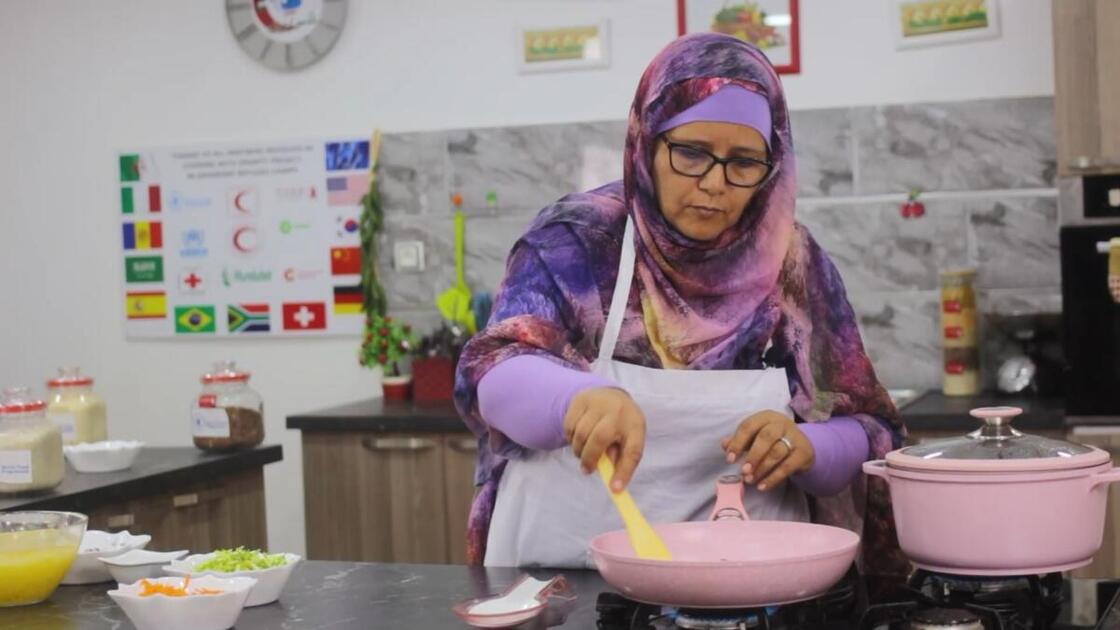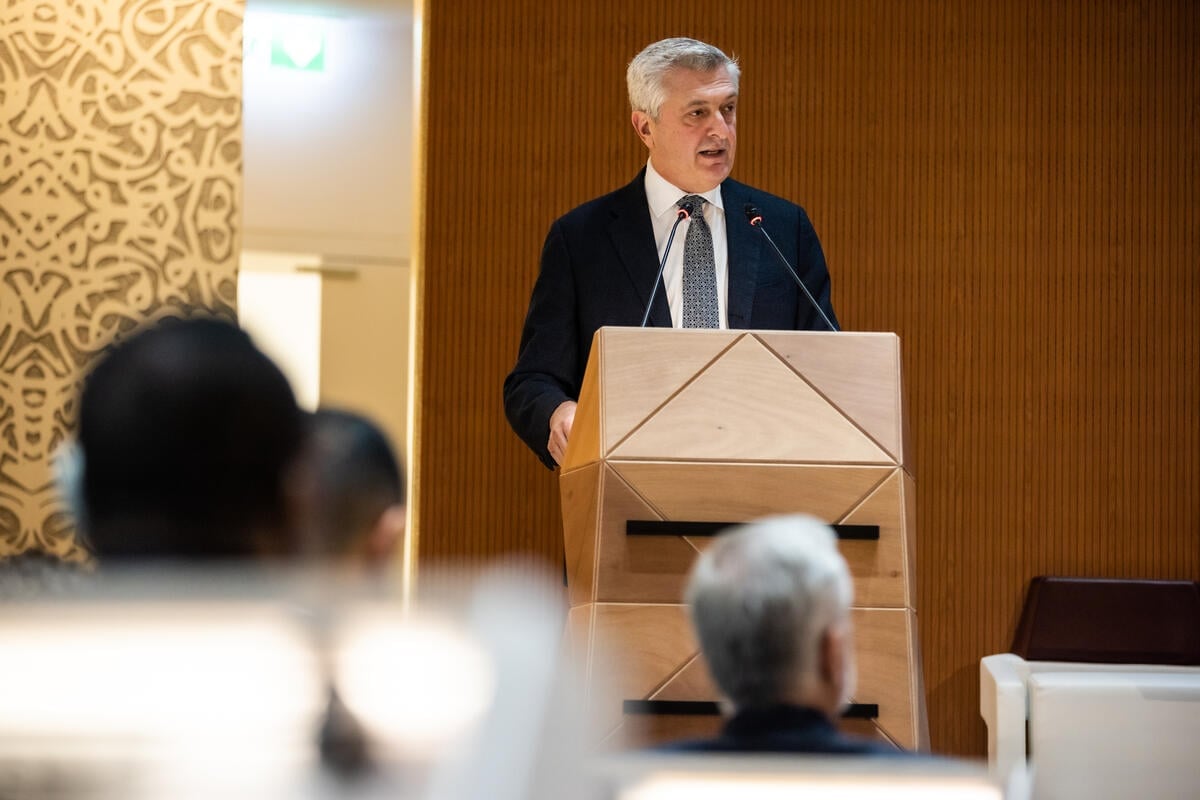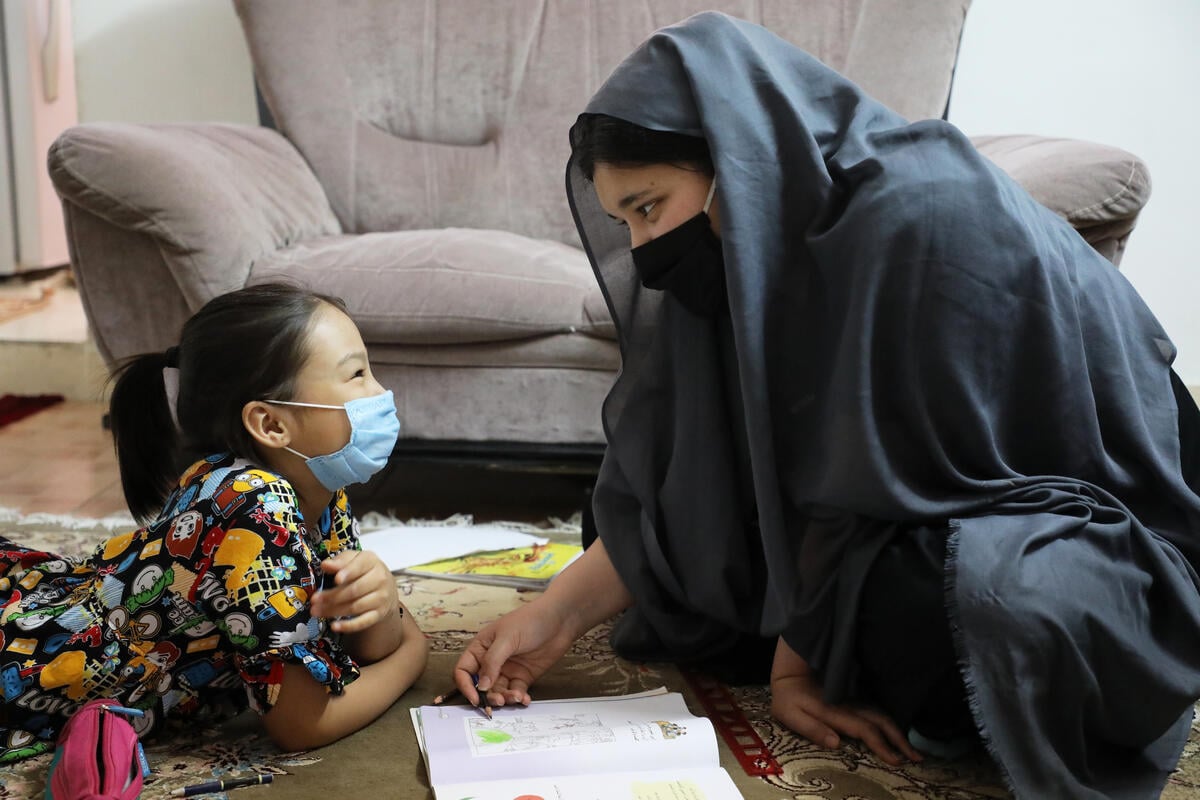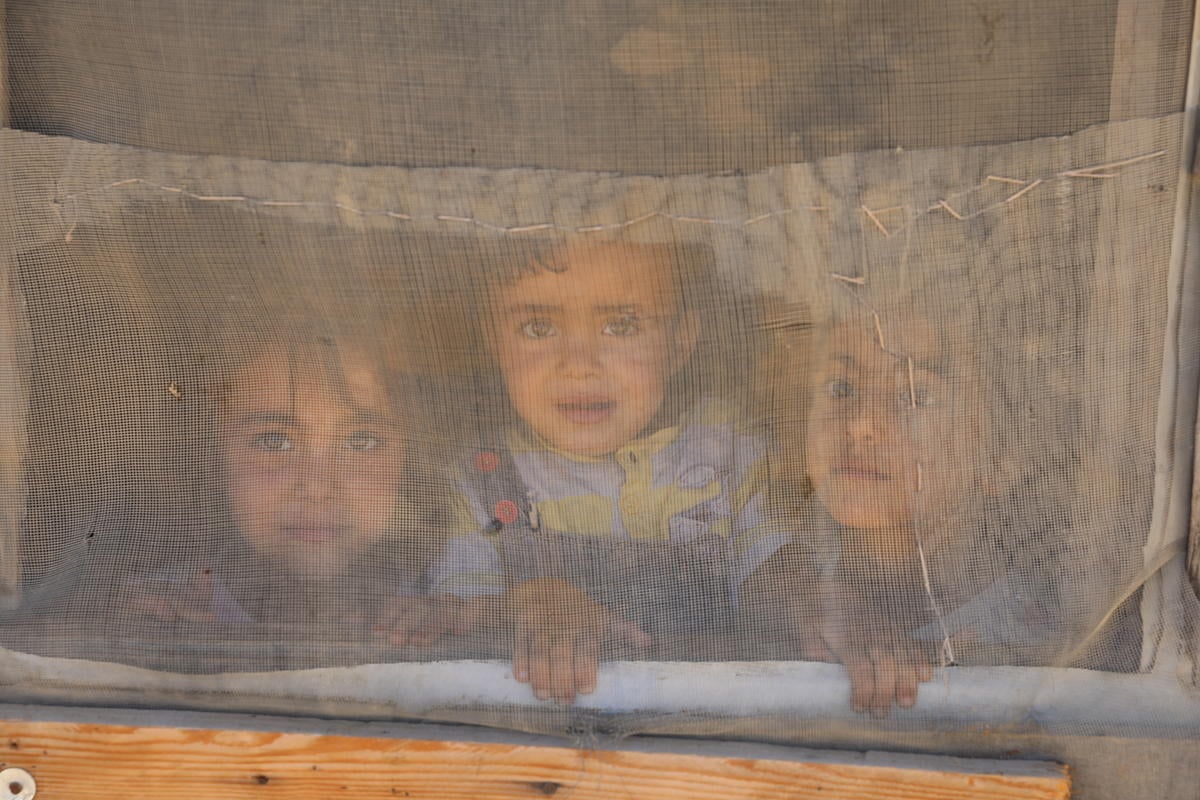From refugee to saviour: the story of Majed and Joseba

From refugee to saviour: the story of Majed and Joseba
In 2019, volunteers in the city of Bilbao, northern Spain, welcomed a family of Syrian refugees as part of a community sponsorship programme. The father, Majed Arar, a butcher by profession, found work in a butcher’s shop run by Joseba Gerrikaetxebarría, a Basque man who suffered from ALS, a rare neurological disease.
What happened next is a testament to the power of brotherhood.
When journalists from El Mundo newspaper heard about the two men, they went to Bilbao to meet them and found themselves caught up in a story more inspiring and tragic than they could possibly have imagined.
Here is El Mundo’s account, which was published with the permission of Joseba’s family on 26 April, 2021.
On the way back from the Guggenheim Museum, Joseba’s hand is tired from gripping his wheelchair’s lever. Each bump and burst of speed is a tiny jolt for someone who cannot walk or move from the neck downwards. So, halfway between the museum and the butcher’s shop, Joseba stops the chair.
“Majed, you drive me now.”
And so, Majed releases the brakes and pushes Joseba’s chair as they go into Bilbao talking about Athletic Bilbao football club.
It’s that simple.
Joseba Gerrikaetxebarria, 62, Basque, former champion in traditional Basque sports, ex-hunter and footballer, has owned a butcher’s shop since 1981. Majed Arar, 40, ex-football player in the Syrian city of Hama, early morning walker before his country’s conflict, is the father of five children and a butcher by trade.
Joseba has ALS.
Majed is a refugee.
It’s that complicated.
This is the story of a Spaniard who was almost forced to close his butcher’s shop and a Syrian, escaping war and hate, who saved that shop.

This is the story of a Syrian who found support and work with Joseba, a Spaniard who received protection and care from Majed.
It’s a back-to-front story about two men who found refuge in each other. It’s a journey in two directions with a cruel twist of fate. It is also a rebuke to prejudice and xenophobia.
“Majed is a massive help. I sit in the back room and he deals with the butcher’s shop. I teach him to write in Spanish and he serves customers and looks after me, because I am 100 per cent dependent. He gives me more than I give him. I’m just sitting here and, after my wife, he’s the one looking after me and giving me affection,” said Joseba in March.
“Joseba is not my boss, or my friend. He’s my brother. I feel I belong in this butcher’s shop. He is always with me providing moral support. I don’t feel alone here,” said Majeb.
Joseba and Majed are like two stars in a movie. Their story has two beginnings: one about the day they met, the other about why they met.
But wait a minute. Cut. The movie has a tragic ending. We visited them on 26 March. It was a day of storytelling, hard truths and deep emotions.
At one point, Joseba became tired and we asked if he wanted a rest. But the former sports champion said we had not come all the way from Madrid just to give up before the end.
Four days later, he was admitted to hospital with COVID-19. We followed developments daily, crossing our fingers for his recovery. And we decided not to publish until he was discharged from the hospital. But the virus had other plans. Joseba died on 7 April.
"The transformation is real. You can see it."
We decided to publish this story only after Joseba’s family gave their consent. We did not know, when we met him, that he only had 12 days to live. Or that ours would be the last photos taken of him and the last words recorded by two men who became brothers and believed in a better world.
Majed and Joseba personify the ideals of a project supported by UNHCR, the UN Refugee Agency, that allows families and individuals to welcome refugees into their own neighbourhoods.
In exchange for their empathy, communities learn about the injustice of racism, the delight of solidarity, and they find the joy in being rather than having things.
The scheme aims to identify vulnerable refugees, involve central and regional governments in host countries and bring together local groups and neighbourhood leaders to create a reception network. It can include providing the refugee family with a flat, a job, a school, catch-up classes, access to childcare, sport and culture.
The name of the programme is Community Sponsorship.
“The programme transforms citizens, refugees and institutions. Drop by drop it seeps through, because society wants to help, it just doesn’t know how. The transformation is real, you can see it,” said María Zabala, who runs the hosting, integration and durable solutions unit at UNHCR Spain.
Since 2019, 10 Syrian families have experienced the programme in Spain, five in the Basque Country and five in the Valencia region: 53 women, men, girls and boys. Another two families are due to arrive in Navarre.
UNHCR has signed agreements with the Basque government, Caritas and the Jesuit Platform. In all, five groups of volunteers received five families in Arrigorriaga, Portugalete, Andoain, Vitoria and Bilbao.
Flashback: Bilbao, 26 March, 2019
A group of volunteers is waiting for a bus. They look more nervous than the travellers who are about to arrive.
Seven people set foot in Bilbao for the first time. It’s just a small step down from the bus but a great leap for solidarity. They are Majed, Khatoun and five children hiding between their parents’ legs nervously.
“We hugged each other and we saw that they were a lovely family,” said Vicente Villate, who went on to play a key role in their lives.

Vicente had already spent his career fighting for the homeless, drug addicts, victims of ETA violence, victims of torture, unaccompanied children, migrants, the unemployed and people who are excluded from society.
“We explained to the neighbourhood that the UNHCR project lasts two years. Caritas has a house that a woman had left them in her will and people started to bring beds, blankets, utensils,” he said.
“We also asked who could help them when they arrived and, at the same time, we told the neighbours that a Syrian family was coming to the area. So, people already knew about them before they arrived,” he said.
This is the Arar family: Majed is 40, father of the children and a butcher. Khatoun, 40, mother of the children and an aspiring hairdresser. Janoub, 12, future astronaut, Raji, 10, self-proclaimed future Real Madrid star, Ammar, 5, Layeq, 4, and Hannen, 2.5, for whom life is a game.
They are a happy family and the Basques talk about a two-way street between the family and the Europeans.
“These refugees teach us the greatness of living with only what you need and the value of joy,” said Marian.
“They help us put things in perspective,” said Ana.
“They stick together, it’s such a contrast to individualism,” said Carmen.
“This experience is a therapy against racism,” said Joxin.
"They are more hopeful than we are because they've been through worse."
“Spanish law makes it hard for Syrians to get their papers. The community sponsorship programme is great, but what happens when it ends? We are fighting to get them basic income support. Community sponsorship and subsidies should be extended to more families,” said Vicente.
“They are more hopeful than we are because they’ve been through worse,” said Laura.
When the Arar family arrived in Bilbao the volunteers acted as one to welcome them.
Carmen, Joxin and Olatz taught them Spanish and Basque, Vicente took Khatoun and the baby to their hospital visits and Naia helped with household accounts. Other volunteers ran errands. Bookshops gave school textbooks, a clothes shop gave socks and underwear, pharmacies provided products and several others gave money.
A Basque-language Christian school admitted the children free of charge, the regional government promised them a subsistence allowance and the volunteer team signed Majed up for a cooking course.
And then the pandemic arrived.
Majed was a butcher and he had also worked in abattoirs in Syria and Jordan. Vicente and Joseba were friends and one day they bumped into one another in the neighborhood. Something clicked for Vicente.
Butcher’s shop - neighbourhood - Joseba - Majed.

This is the other start to this story.
Bilbao, 26 March, 2021
We are in Joseba’s butcher’s shop, the sort of place where your mouth waters. On the far side of the counter is a back room with tables for quartering, a cooker, an industrial fridge and a wall with photos.
Joseba examines the display cabinet and Majed fillets a piece of topside that is destined for us journalists.
“You are to eat it, eh. You’ve got a long journey back to Madrid,” he said.
“Absolutely Joseba, my friend,” I replied.
Joseba was walking in the hills one day years ago with his shotgun when he felt his legs go weak. Gradually, over days, weeks, months and years, his range of movement decreased and he was diagnosed with ALS.
However, on 26 March, 2021, his mind and voice were free as he continued his story.
“The butcher I employed told me he was leaving. I could not serve in the shop anymore and I was going to have to close. But Vicente told me about Majed and I gave him a trial run. As soon as I saw him honing the knife, I knew he was good. He told me he was frightened of the language. I said: ‘Don’t worry. I’ll talk to the people. You cut and serve the meat.’”The next day he was there at nine on the dot.”
After seeing him work and getting to know him, Joseba changed Majed’s three-month contract into a permanent one. Majed opened and closed up the butcher’s, prepared the orders, served the customers and honed his brotherly relationship with Joseba.
“Joseba, what is Majed to you?” I asked.
He said: “He helps with everything. He keeps the business going and is by my side. The butcher’s shop is an escape, a relaxation, a therapy for me. If it weren’t for him, I wouldn’t have any of this. He is the best worker I’ve had in 40 years. I took his measure straight away. I saw he was a great guy. One day he saw a bulging wallet lying in the street and he went to the police station and returned it. Two days later the police called him because the owner of the wallet wanted to give him some money, but Majed wouldn’t accept it.”
“And at a personal level?” I asked.
“Uff … He’s my friend. I depend on him 100 per cent and he is alert to everything. He feeds me if we both eat in the shop, he puts my mask on for me, he helps me with my mobile phone. Every day he comes out to receive me and says goodbye, he takes care of my health. He helps me in everything. He’s my carer …”
"He is my brother."
And then his voice catches and falters.
And tough old Joseba showed he had a soft heart.
“What was that story about the hug?” I ask.
“Ah, yes …One day Majed asked me what had happened to me. I told him, he bent down to hug me and he kissed me twice. And there were the two of us, crying…”
Majed hears us and carries on cutting meat, flaming it for a moment with a pinch of salt and bringing Joseba a fork, together with a swig of txakoli wine.

Majed Arar used to run 10 kilometres a day and was managing a butcher’s shop in Syria when he met Khatoun. They got married and had children, but extremism and the war made them refugees.
They arrived in Jordan and invented another life for themselves there, and had another three children.
“Majed, what is Joseba to you?” I ask.
“He is my brother. Here I am never alone. Joseba helps me in everything. He teaches me to read and write. He explains things and I learn. And he’s a fan of Athletic Bilbao, like me.”
“What do you like about this place?” I ask.
“We are Christian. We go to church on Saturdays and Sundays. We like the people of Bilbao. We want to stay forever. The children do video calls to the family in Syria and talk in Basque, ha ha … For them, everything is about Bilbao. If they want to know where Syria is, they ask whether it’s near or far from Bilbao.”
"They needn't be scared."
With Majed everything seems easy.
Although he doesn’t talk about the past, the horror makes itself known.
“I tell my children that in Spain the police treat people better. And that if they see men with big black beards, they needn’t be scared. Back there, some people had beards and machine guns and it was very frightening,” Majed said.
We go out to take photos near the Guggenheim Museum. We talk about football, about politics and, innocently, about the pandemic.

Elisa, Joseba’s wife, has already arrived at the butcher’s shop with the adapted vehicle. We go back to the neighbourhood with Majed pushing the wheelchair. Adroitly, Joseba positions it on the ramp of the van. Elisa is in charge of the operation. Before shutting the back door, Majed goes up to Joseba, who whispers something to him. They both laugh.
Joseba and Majed are each other’s refuge.
Twelve days later, Joseba will be dead, and all Majed will be able to do is to repeat: “my brother, my brother”.
Bilbao, 8 April, 2021
The morgue is a picture of grief. Days later, at the funeral on 12 April, Vicente will make everyone cry: “Joseba could not have imagined what that job meant for Majed. It didn’t just open a path for them, but for many people who welcome migrants. Not even Joseba could grasp the full meaning of his gesture. Thank God for having introduced us to Joseba. Joseba, thank you for the opportunity you gave us.”
Now, in the morgue, Vicente and the volunteers are gathered with Joseba’s family. Elisa hasn’t come because she tested positive for COVID-19, but Aratz is here, a friendly and solid son. Khatoun and Majed have had 24 hours of dealing with a death made harder by the pandemic.
“Joseba’s body is no longer here, but he is looking down on us from heaven,” Majed said, adding: “My brother, my brother.”
Bilbao, 21 April, 2021
Majed continues to open up the butcher’s shop, cutting topside and speaking his broken Spanish and Basque to bereft neighbours.
Vicente goes to see him in the mornings and the other day took him a cup of coffee. When they realized in the bar that it was for Majed, they didn’t charge him for it.
“What will happen to Majed,” I wonder.
Vicente answered: “It will depend on Joseba’s family, but I remember one thing Joseba told me: ‘Vicente: my only wish for the business is that yields enough so Arar’s family has a living wage.’"
Joseba is at peace.









